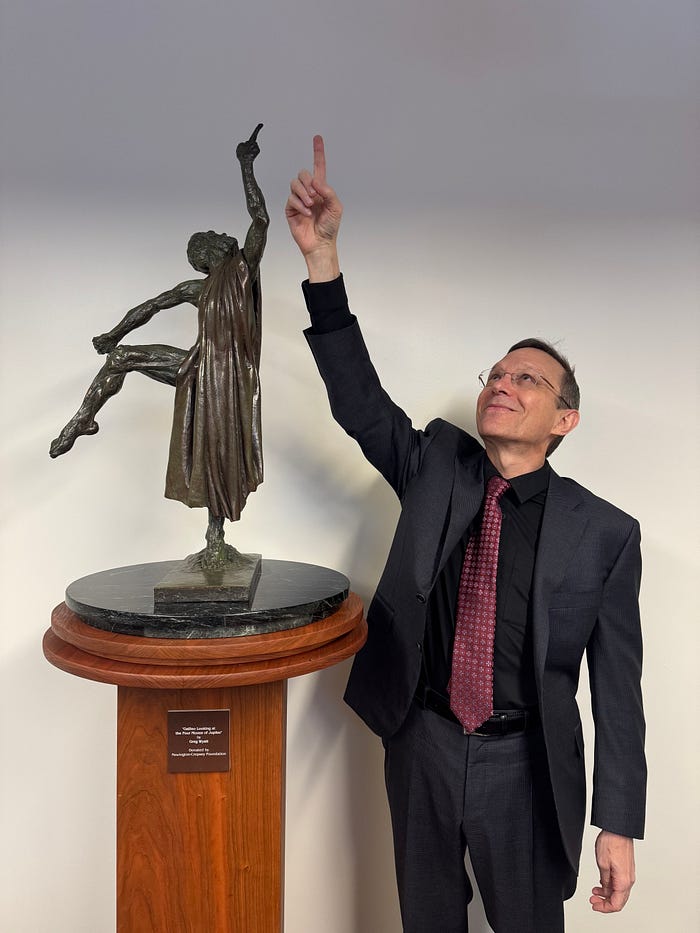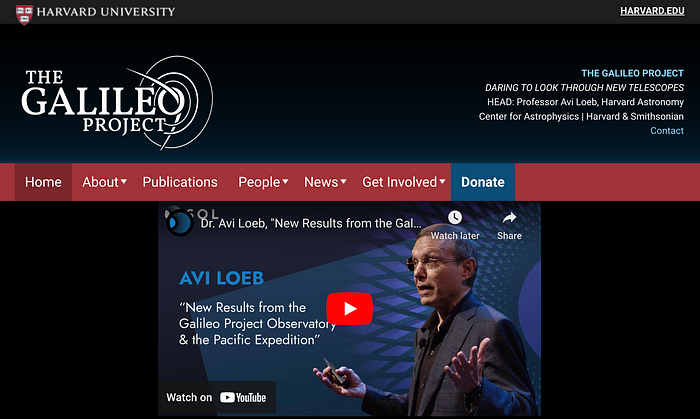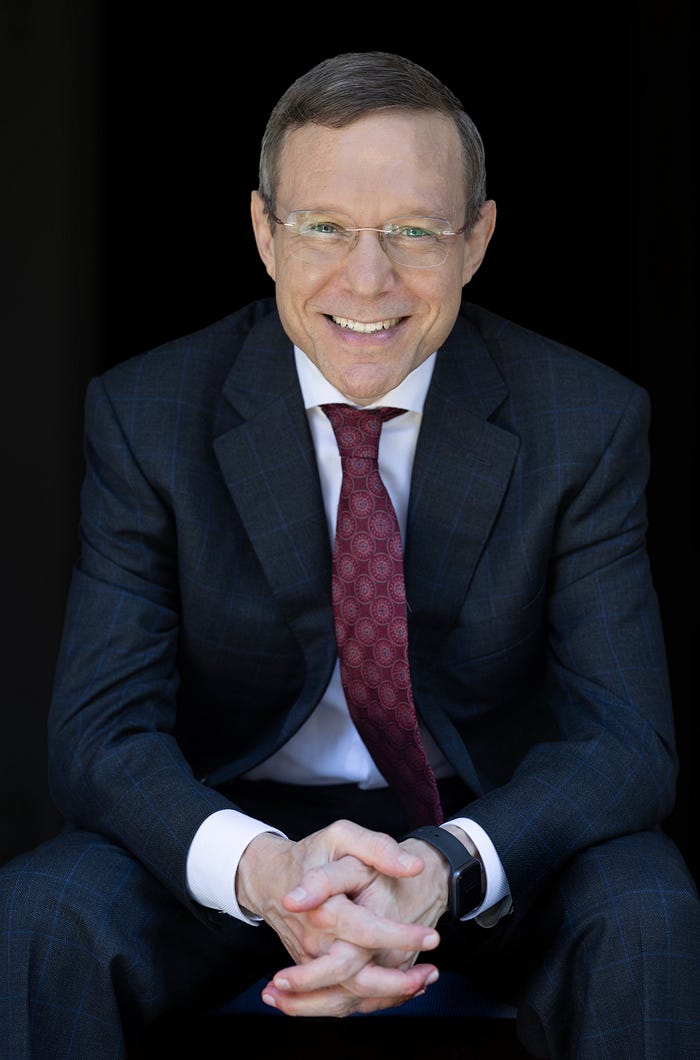
For the first time in 32 years since my arrival at Harvard, I am sharing my office with a companion. My office mate is a bronze sculpture created by the remarkable artist Greg Wyatt and donated by the Newington-Cropsey Foundation. The sculpture is titled “Galileo Looking at the Four Moons of Jupiter.” Standing on the pedestal of history, Galileo’s finger reaches above my head and points to the sky, as if it argues: “Look up!”
My connection to Galileo runs deep. In 2012, I was awarded to give a series of lectures under the title “Cattedra Galileiana” at the prestigious Scuola Normale Superiore, located in the Italian town of Pisa — where Galileo was born 448 years earlier. “Galileo” is derived from “Galilee,” the name of a region in Northern Israel — the country where I was born. When I suggested that the anomalous interstellar object `Oumuamua might be of extraterrestrial technological origin, an Italian reporter asked: “Do you think that you are Galileo?”
Galileo’s confrontation with the prevailing dogma of his time did not end well for him. But the Vatican admitted 350 years after Galileo’s death that he was right. Often, the dogmatic mainstream does not want to take seriously a “black swan event,” with evidence that falsifies its worldview.
But reality is under no obligation to make the mainstream happy. Richard Feynman’s quote should be repeated by all fledgling physicists at their PhD graduation ceremony: “It doesn’t make a difference how beautiful your guess is. It doesn’t make a difference how smart you are, who made the guess, or what his name is. If it disagrees with experiment, it’s wrong.”
Not everyone listens. Some theoretical physicists dedicate their entire career to a mathematically-sophisticated storyline, with no prospects for obtaining evidence that supports or disputes it. Over the past forty years, the mainstream in theoretical physics calculated the implications of extra dimensions in the context of string theory with no concern for a direct experimental test.
Galileo’s lesson is not embraced also on the phenomenological side of physics. Some experimental physicists ignore anomalous data that contradicts their belief because of a cognitive dissonance. Before 1803, it was widely believed among empiricists that rocks do not fall from the sky. This popular belief was abandoned after more than 3,000 stones were witnessed during a meteor shower in the town of L’Aigle, France. The lesson from this example is simple: we should have no prejudice about the nature of the packages that arrive to our neighborhood from afar.
This lesson should be kept in mind when considering Unidentified Anomalous Phenomena (UAP). Soon, we might get a better idea about classified UAP reports within the U.S. government following this week’s announcement of a new task force, led by Rep. Anna Paulina Luna from the House Oversight Committee. But science is better than politics. Inspired by Galileo’s legacy, the Galileo Project that I co-founded with Frank Laukien aims to collect scientific-quality data on UAP from three new observatories during 2025. My Galileo research team is using artificial intelligence (AI) to analyze the data, as reported in its latest publications.

From the perspective of AI, experimental data collected by calibrated instruments can be regarded as the ideal training dataset on which human intelligence is based. The quality of scientific thoughts is shaped by the data that the human brain is trained on. The genius of Galileo was in recognizing that science is a learning experience, long before the emergence of AI.
Can AI save science from the vanity of dogmatism? In a better world, Galileo’s truth about physical reality could have been recognized at his time and not centuries later.
Can AI save nations from intelligence failures in “black swan events,” when analysts dismiss data because of wrong assumptions? In a better world, the use of AI to analyze intelligence data could have saved many lives by preventing unnecessary wars in the Middle East or Ukraine.
Evidence-based science goes against the drift of the human mind towards wishful thinking. It is also important to recognize that the leading technologies of today are based on curiosity-driven science of the past. Spacecraft launched by NASA and ESA would have never reached Mars if our engineers insisted that Mars revolves around the Earth, as the Vatican’s priests did during Galileo’s time.
The tech support provided by wealthy entrepreneurs to the new Trump administration promotes AI as a boon to the U.S. economy and national security. However, the state-of-the-art silicon-based chips that enable the businesses of AI and quantum computers, are manufactured at the atomic level based on our understanding of quantum mechanics. The principles governing the quantum world were discovered by curiosity-driven research just a century ago. Funding AI and neglecting the fundamental science of today will prevent us from making the scientific breakthroughs of the future. Without them, we will miss the industries of the future.
Feynman echoed the main lesson learned from Galileo: “For a successful technology, reality must take precedence over public relations, for Nature cannot be fooled.”
ABOUT THE AUTHOR

Avi Loeb is the head of the Galileo Project, founding director of Harvard University’s — Black Hole Initiative, director of the Institute for Theory and Computation at the Harvard-Smithsonian Center for Astrophysics, and the former chair of the astronomy department at Harvard University (2011–2020). He is a former member of the President’s Council of Advisors on Science and Technology and a former chair of the Board on Physics and Astronomy of the National Academies. He is the bestselling author of “Extraterrestrial: The First Sign of Intelligent Life Beyond Earth” and a co-author of the textbook “Life in the Cosmos”, both published in 2021. The paperback edition of his new book, titled “Interstellar”, was published in August 2024.
